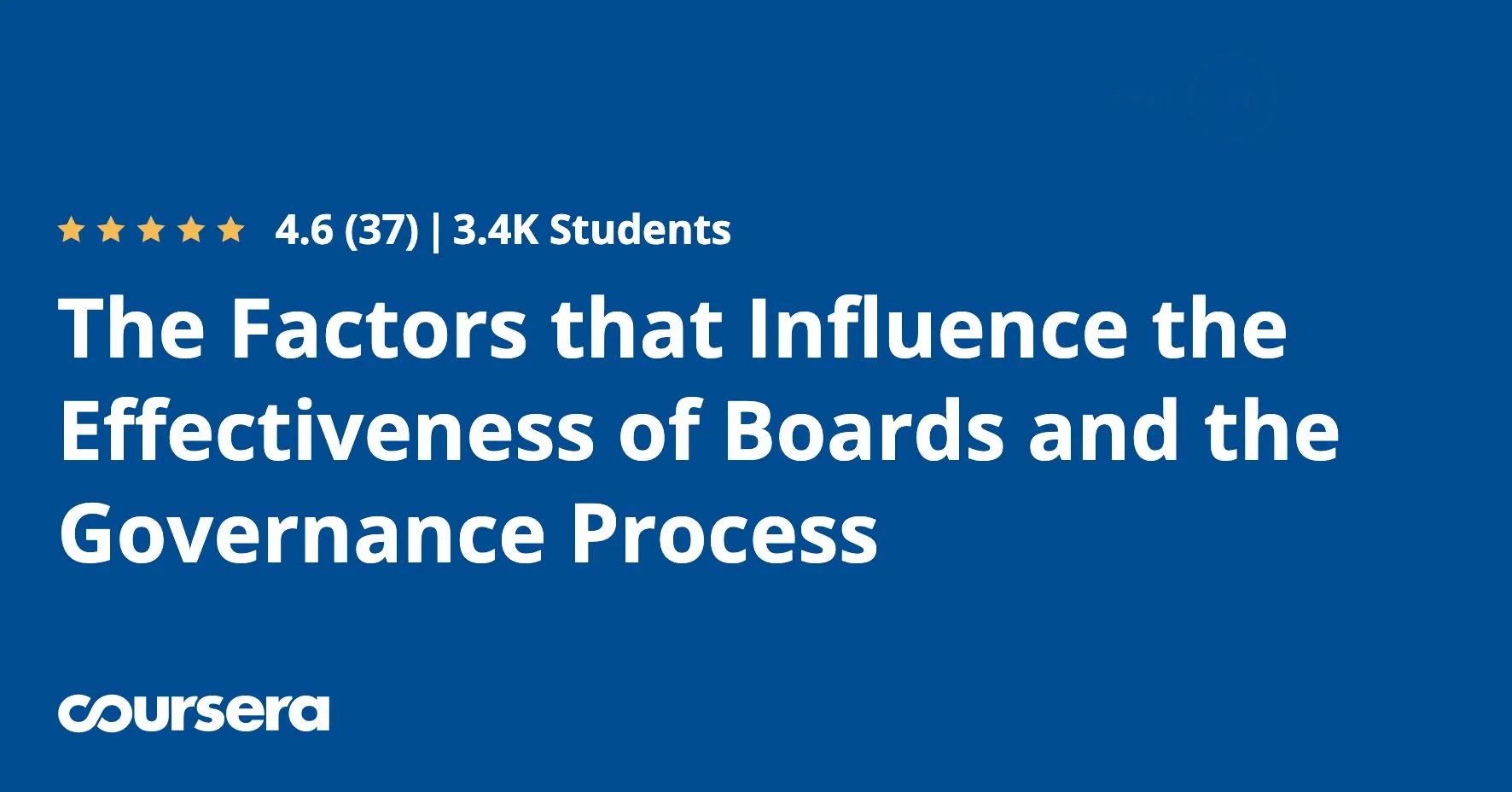
The Factors that Influence the Effectiveness of Boards and the Governance Process 
This course explores the various factors that affect the effectiveness of boards of directors and the governance process, providing an in-depth look at the roles and responsibilities of board members. ▼
ADVERTISEMENT
Course Feature
![]() Cost:
Cost:
Free
![]() Provider:
Provider:
Coursera
![]() Certificate:
Certificate:
Paid Certification
![]() Language:
Language:
English
![]() Start Date:
Start Date:
Self Paced
Course Overview
❗The content presented here is sourced directly from Coursera platform. For comprehensive course details, including enrollment information, simply click on the 'Go to class' link on our website.
Updated in [March 06th, 2023]
This course, The Factors that Influence the Effectiveness of Boards and the Governance Process, is the third in a Specialization that introduces learners to the roles and responsibilities of nonprofit boards of directors. It provides an overview of the factors that influence the effectiveness of boards and the governance process. Learners will gain an understanding of the importance of board composition, board culture, and board dynamics, and how these factors can impact the success of the organization. The course also covers the roles of board members, the importance of board meetings, and the role of the board chair. Finally, the course provides an overview of the legal and regulatory environment in which boards operate. By the end of the course, learners will have a better understanding of the factors that influence the effectiveness of boards and the governance process.
[Applications]
The application of this course can be seen in the development of effective boards of directors in North America. It can be used to help identify the factors that influence the effectiveness of boards and the governance process, and to develop strategies to ensure that boards are effective in carrying out their roles and responsibilities. Additionally, the course can be used to help organizations in other parts of the world to understand the factors that influence the effectiveness of their boards and the governance process, and to develop strategies to ensure that their boards are effective in carrying out their roles and responsibilities.
[Career Paths]
1. Nonprofit Board Member: Nonprofit board members are responsible for providing oversight and guidance to the organization they serve. They are responsible for setting the organization’s mission and vision, developing policies and procedures, and ensuring that the organization is compliant with all applicable laws and regulations. As the nonprofit sector continues to grow, the demand for qualified board members is expected to increase.
2. Nonprofit Executive Director: Nonprofit executive directors are responsible for leading the organization and ensuring that it meets its goals and objectives. They are responsible for developing and implementing strategies, managing staff, and overseeing the organization’s finances. As the nonprofit sector continues to grow, the demand for qualified executive directors is expected to increase.
3. Nonprofit Consultant: Nonprofit consultants provide advice and guidance to nonprofit organizations on a variety of topics, including fundraising, strategic planning, and board development. As the nonprofit sector continues to grow, the demand for qualified consultants is expected to increase.
4. Nonprofit Fundraiser: Nonprofit fundraisers are responsible for developing and implementing fundraising strategies to support the organization’s mission and vision. They are responsible for identifying potential donors, cultivating relationships with donors, and managing fundraising campaigns. As the nonprofit sector continues to grow, the demand for qualified fundraisers is expected to increase.
[Education Paths]
1. Bachelor of Business Administration: This degree program provides students with a comprehensive understanding of business principles and practices, including financial management, marketing, and organizational behavior. It also covers topics such as corporate governance, strategic planning, and risk management. This degree is becoming increasingly popular as organizations look for leaders who understand the complexities of the modern business environment.
2. Master of Science in Nonprofit Management: This degree program focuses on the unique challenges faced by nonprofit organizations, such as fundraising, volunteer management, and public relations. It also covers topics such as financial management, strategic planning, and organizational development. This degree is becoming increasingly popular as organizations look for leaders who understand the complexities of the nonprofit sector.
3. Master of Public Administration: This degree program focuses on the management of public sector organizations, such as government agencies and nonprofit organizations. It covers topics such as public policy, budgeting, and organizational behavior. This degree is becoming increasingly popular as organizations look for leaders who understand the complexities of the public sector.
4. Doctor of Philosophy in Organizational Leadership: This degree program focuses on the study of leadership and organizational behavior. It covers topics such as decision-making, motivation, and communication. This degree is becoming increasingly popular as organizations look for leaders who understand the complexities of leading and managing organizations.
Pros & Cons

Improves Leadership and Governance in nonprofit organizations

Provides practical guidance and evidencebased best practices

TeamBased Learning and Readiness Assurance Tests

Practiceoriented

Required readings not freely available

Course 1 and 2 overlap materials

Difficult to attend and focus due to deadlines.
Course Provider

Provider Coursera's Stats at AZClass
This course explores the various factors that affect board effectiveness and the governance process, providing insight into the roles and responsibilities of board members. The third course in this specialization introduces you to the factors that affect the effectiveness of boards of directors in carrying out their responsibilities, and the influence boards have in shaping the success of the organizations they manage. While this course was developed with North American culture in mind, they do realize that the nature of the factors that affect nonprofit board effectiveness may be different in other parts of the world.
Discussion and Reviews
0.0 (Based on 0 reviews)
Explore Similar Online Courses

Build a Full Stack Twitter clone with Nextjs

Introduction to Systematic Review and Meta-Analysis

Python for Informatics: Exploring Information

Social Network Analysis

The Analytics Edge

DCO042 - Python For Informatics

Causal Diagrams: Draw Your Assumptions Before Your Conclusions

Whole genome sequencing of bacterial genomes - tools and applications

Leadership Skills Mastery Vol 1: Leadership for 2019

What is Leadership?

Leadership for Creatives: Find Your Own Style


Start your review of The Factors that Influence the Effectiveness of Boards and the Governance Process